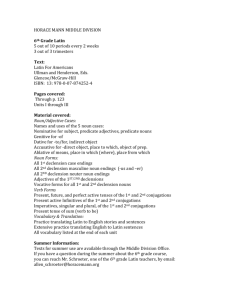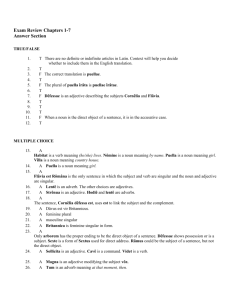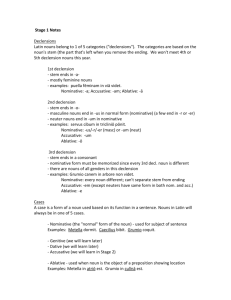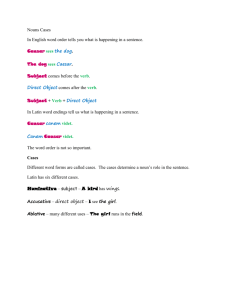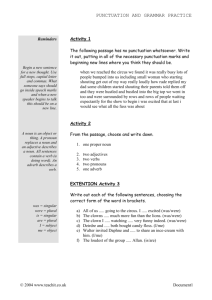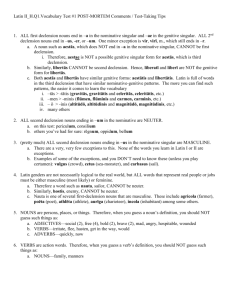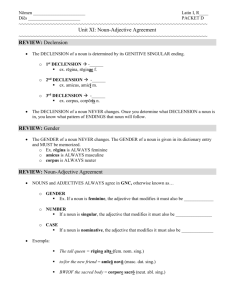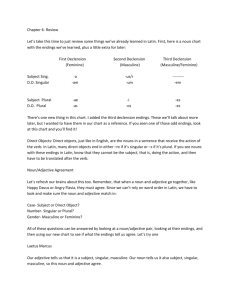Case
advertisement
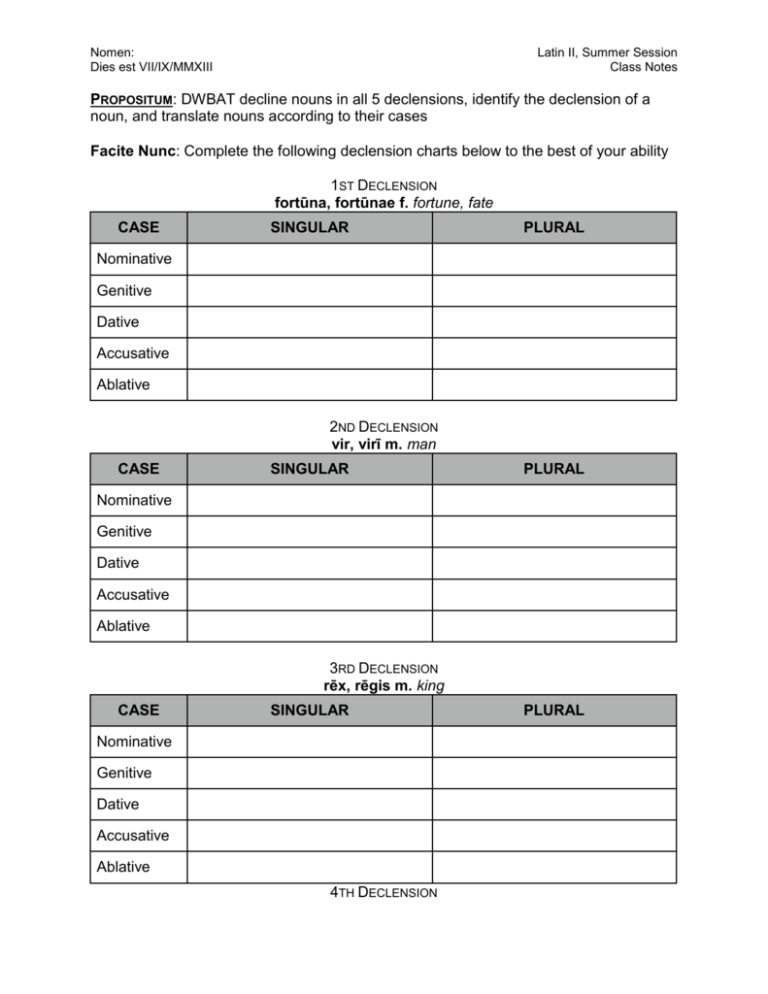
Nomen: Dies est VII/IX/MMXIII Latin II, Summer Session Class Notes PROPOSITUM: DWBAT decline nouns in all 5 declensions, identify the declension of a noun, and translate nouns according to their cases Facite Nunc: Complete the following declension charts below to the best of your ability 1ST DECLENSION fortūna, fortūnae f. fortune, fate CASE SINGULAR PLURAL Nominative Genitive Dative Accusative Ablative 2ND DECLENSION vir, virī m. man CASE SINGULAR PLURAL Nominative Genitive Dative Accusative Ablative 3RD DECLENSION rēx, rēgis m. king CASE SINGULAR Nominative Genitive Dative Accusative Ablative 4TH DECLENSION PLURAL Nomen: Dies est VII/IX/MMXIII Latin II, Summer Session Class Notes senātus, senātūs m. senate CASE SINGULAR PLURAL Nominative Genitive Dative Accusative Ablative 5TH DECLENSION rēs, reī m. thing, situation CASE SINGULAR PLURAL Nominative Genitive Dative Accusative Ablative Neuter Rule For a neuter noun of ANY declension, the __________ singular is identical to the _________ singular and the ___________plural and the ___________plural end in the letter ‘___’. Determining Declension Number A noun’s declension number can be determined from its __________ singular ending. Declension 1st 2nd 3rd 4th 5th Gen. Sg. Ending Nomen: Dies est VII/IX/MMXIII Latin II, Summer Session Class Notes Once a noun’s declension is known, we then know what set of endings that noun may have. That set of endings is added to the stem of that noun. The stem of a noun is determined by removing the _______ singular ending from the ___________ singular form of the word. Ex. puella, puellae f. girl • This noun is a 1st declension noun because it’s genitive singular ending is -ae. • It’s stem is puell- (genitive singular form “puellae” - gen. sg. ending “-ae” = puell-) • To decline it, add 1st declension endings (-a, -ae, -ae, -am, -ā, -ae, -ārum, -īs, -ās, -īs) Exerceāmus! (Let’s Practice) Determine the declension of the following nouns, give their stems, and then decline them in the case and number combinations given. Leave d) blank until after we review. 1. dux, ducis m. leader a) Declension number: __3rd___ b) Noun stem: __duc-___ c) Nominative plural form: ____ducēs____ d) Translation: ____________ 2. exercitus, exercitūs m. army a) Declension number: _____ b) Noun stem: ________ c) Ablative plural form: _______________ d) Translation: ____________ 3. bellum, bellī n. war a) Declension number: _____ b) Noun stem: ________ c) Accusative plural form: _______________ d) Translation: ____________ 4. insula, insulae f. island a) Declension number: _____ b) Noun stem: ________ c) Genitive plural form: _______________ d) Translation: ____________ 5. diēs, diēī m. day a) Declension number: _____ b) Noun stem: ________ c) Accusative singular form: _______________ d) Translation: ____________ 6. corpus, corporis n. body a) Declension number: _____ b) Noun stem: ________ c) Dative singular form: _______________ d) Translation: ____________ Nomen: Dies est VII/IX/MMXIII Latin II, Summer Session Class Notes 7. agricola, agricolae m. farmer a) Declension number: _____ b) Noun stem: ________ c) Dative plural form: _______________ d) Translation: ____________ 8. arbor, arboris f. tree a) Declension number: _____ b) Noun stem: ________ c) Ablative plural form: _______________ d) Translation: ____________ 9. impetus, impetūs m. assault, attack a) Declension number: _____ b) Noun stem: ________ c) Accusative plural form: _______________ d) Translation: ____________ 10. amor, amoris m. love a) Declension number: _____ b) Noun stem: ________ c) Ablative singular form: _______________ d) Translation: ____________ Translating Nouns Latin nouns have different cases because each cases serve to explain the way that noun is functioning in a given sentence, whether it be a subject, direct object, indirect object, etc. As a result, there are stock formulas we can generally use to translate nouns according to case. After reviewing the chart below, translate part d) for numbers 1-10 above. Case Latin Form English Translation rēx the king _(verb)_ Genitive rēgis of the king Dative rēgī to/for the king rēgem __(verb)__ the king rēge BWIOF the king Nominative Accusative Ablative
